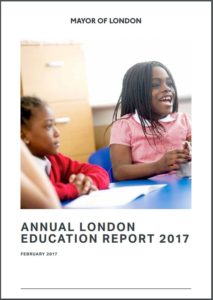Last month St Mary’s University Twickenham’s Benedict XVI Centre for Religion and Society published a report entitled The take-up of free school meals in Catholic schools in England and Wales. The report is designed to undermine the credibility of free school meal (FSM) eligibility as an indicator of pupils’ socio-economic status and suggest that other indicators, such as the Income Deprivation Affecting Children Index (IDACI), have greater and more accurate explanatory power. We’ve been through and analysed the evidence presented in the report, and unfortunately it doesn’t really stack up.
Free school meal eligibility/take-up
The central point of the report is that FSM eligibility and FSM take-up are two very different things, but despite this ‘there is a widespread tendency to conflate actual receipt of FSM with “eligibility”’. This is somewhat true. In fact, the Department for Education (DfE) itself has clarified that:
‘pupils who are in theory eligible for free school meals but whose parents do not submit a claim are not recorded as being eligible for free school meals. The department does not hold information about individual pupils who are eligible but do not make a claim for free school meals.’
This is problematic, the report claims, because there may be something unique to the intake of Catholic schools which means that FSM take-up is lower, when compared to eligibility, than in average schools. If this is the case, Catholic schools may well have relatively more FSM eligible pupils than they are currently being given credit for.
What, then, might this unique characteristic of Catholic school intakes be? The report identifies this characteristic as the fact that Catholic schools ‘take a markedly high proportion of pupils from ethnic minorities’ when compared to non-Catholic schools. (As a point of fact, Catholic schools take a higher proportion of children classified as ‘black ethnic origin’ specifically, while performing significantly worse than average on inclusion of ‘Asian ethnic origin pupils’. But we’ll forget about that for now.) The reason this high proportion of ethnic minority pupils matters is that, according to the report, take-up of FSM is lower in certain groups, particularly among ethnic minorities or those for whom English is not a first language.
You’d have thought that this claim would be accompanied by some supporting evidence, but unfortunately there’s almost none in the way of that. Indeed, the only prior supporting evidence comes in the form of an ‘unpublished’ Catholic Education Service (CES) report from 2015 which detailed the results of a survey of the headteachers of just 20 schools in just one London borough (Southwark). The survey asked headteachers what factors they thought impacted upon FSM take-up and revealed that ‘many’ of the respondents reported that ‘cultural perception of welfare combined with language barriers’ led to low FSM take-up. No figures are given for how many of the 20 respondents said this and no explanation is given for how the respondents reached this conclusion.
What’s more, a new (very similar) survey conducted for this new report does nothing to bolster the 2015 survey’s findings, and even the researchers themselves state that ‘the findings…need to be treated with caution due to the brevity of the study and the difficulty in gaining access to the schools and the parents.’ And of course, there is an extent to which all of this is moot anyway. Catholic schools may well take more pupils from ethnic minorities than other schools, but not sufficiently more to account for the socio-economic selectivity of Catholic schools. Indeed, the rate of FSM take-up among ethnic minorities would have to be more or less zero for it to explain the poor record of Catholic schools on FSM eligibility/take-up. Given that this clearly isn’t the case, the authors of this report are, at best, trying to argue that Catholic schools are not as socio-economically selective as is claimed, but that they’re still socio-economically selective nonetheless.
So, there’s little to no evidence (or at least none presented here) that the intakes of Catholic schools are more prone to low FSM take-up than any other kind of school. And even if they are, this still doesn’t get Catholic schools out of gaol. Until such a time as the claims in this report can be substantiated and properly evidenced – and it seems very likely that this time will never come – Catholic schools should be treated by government for what they are: socio-economically selective in the extreme and a significant barrier to social mobility and integration.
Income Deprivation Affecting Children Index (IDACI)
The other chief problem with the report is its insistence that ‘evidence from other governmental measures overwhelmingly suggests that Catholic schools recruit disproportionate numbers of pupils from families in the lower socio-economic brackets.’ Again, this is not accurate.
The basis of this claim, which is by no means a new one, lies with the IDACI. IDACI measures the proportion of children in a local area that live in low income households. Anyone can enter their postcode into the IDACI online tool and see how deprived the area surrounding that postcode is, as a rank against all other areas nationally. Using this tool, the Catholic Education Service (CES) has compared the proportion of children in Catholic schools that live in the most income-deprived areas, to the national average of all state schools. From this, as is set out in the report, it calculates that ‘children from each of the four lowest (i.e. most income-deprived) deciles are overrepresented in both Catholic primary and secondary schools in England.’
But what does this really prove? Not much. That’s because the CES analysis omits any consideration of the location of Catholic schools, which is surely important if one is to claim that Catholic schools take a disproportionate number of pupils from deprived areas.
Unfortunately for the CES, the FAC did consider this back in 2014 and found that Catholic schools are much more likely to be in deprived areas that other schools, and much less likely to be in richer areas. No surprise, then, that Catholic schools take more pupils from the most deprived areas than the average school. The real question that must be answered is whether or not Catholic schools are disproportionately more likely to take deprived pupils, given the areas in which they are located. You can see the FAC’s 2014 research for full details on this, but unsurprisingly we found that Catholic schools are even more likely to be situated in more deprived areas than their pupils are. In other words, even when using IDACI Catholic schools take a disproportionately low number of pupils from deprived areas. This conclusion is valid even in spite of the above concerns about FSM eligibility versus take-up.
Last word
So, whether it’s presenting insufficient evidence to support its claims or drawing conclusions well beyond what its (limited) analysis can legitimately be said to demonstrate, the St Mary’s report falls some way short of being robust. If we were feeling charitable, we might simply conclude that the sum of all this is that different ways of measuring things produce different results. Unfortunately, though, Catholic schools are socially selective whatever measure you use.
Notes
For further comment or information please contact the Fair ADmissions Campaign on info@fairadmissions.org.uk or 0207 324 3078.
Read the full report The take-up of free school meals in Catholic schools in England and Wales: https://www.stmarys.ac.uk/research/centres/benedict-xvi/docs/free-school-meal-report.pdf.
Read the FAC’s previous news item ‘Catholic schools and the Income Deprivation Affecting Children Index’: https://fairadmissions.org.uk/catholic-schools-and-the-income-deprivation-affecting-children-index/.
The FAC wants all state-funded schools in England and Wales to be open equally to all children, without regard to religion or belief. The Campaign is supported by a wide coalition of individuals and national and local organisations. We hold diverse views on whether or not the state should fund faith schools. But we all believe that faith-based discrimination in access to schools that are funded by the taxpayer is wrong in principle and a cause of religious, ethnic, and socio-economic segregation, all of which are harmful to community cohesion. It is time it stopped.
Supporters of the campaign include the British Humanist Association, Professor Ted Cantle and the iCoCo Foundation, the Association of Teachers and Lecturers, British Muslims for Secular Democracy, the Campaign for State Education, the Centre for Studies on Inclusive Education, the Christian think tank Ekklesia, the Hindu Academy, the Green Party, the Liberal Democrat Education Association, Liberal Youth, the Local Schools Network, Richmond Inclusive Schools Campaign, the Runnymede Trust, the Socialist Educational Association, and the General Assembly of Unitarian and Free Christian Churches.
 Follow
Follow
